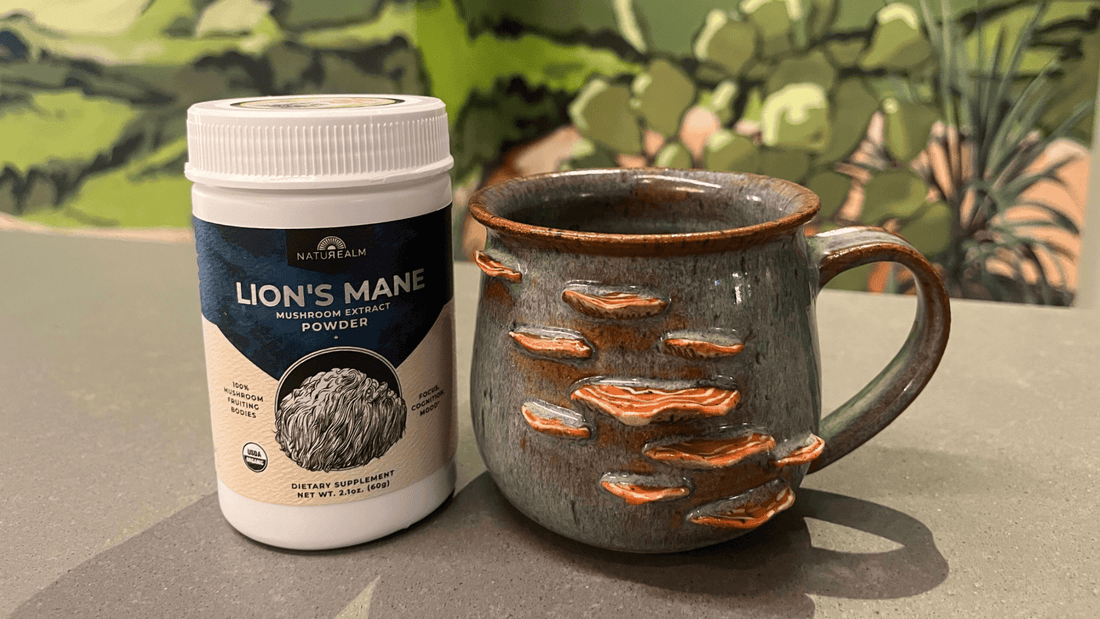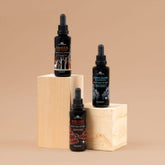
How Lion's Mane Mushrooms Supercharge Your Coffee
Coffee is a lifetime love for some of us. There’s nothing like the smell of fresh ground coffee beans blooming in that first splash of hot water. It seems, however, that my old friend coffee started to turn me to jitters in my 30s.
I was afraid that my reliance on caffeine wasn’t just short-circuiting my days with anxiousness, it was ruining my well-being in the long run. I had already started taking Sacred 7 Mushroom Extract Capsules, but because I’m so low-frills, I hadn’t consistently added the Sacred 7 Powder to my coffee.
When we launched our Lion’s Mane Mushroom Extract Powder, I started adding a scoop into my coffee in the morning. I’ve researched medicinal mushrooms for years, familiar with their brain-boosting benefits and their deep historical record of medicinal healing. In fact, of all our awesome mushroom supplements, it was our Lion’s Mane Mushroom Tincture that I first fell in love with.
But after using the powder for about two weeks, unexpectedly, my routine changed. I just didn’t want three cups of coffee and even found myself reaching for hot water with lemon before and after that first cup. Instead of feeling like my routine is killing me slowly, I can feel the difference when I have my mushroom coffee versus a dairy-packed espresso drink. So that’s my story! Now’s here the science on why.
The Health Benefits of Lion’s Mane Mushrooms

Lion’s Mane mushrooms stimulate the growth of brain cells, improve mental clarity, are good for your gut, and help your body regulate stress. They’ve been used for centuries in Traditional Chinese Medicine to treat a number of ailments, with a big focus on digestion.
Nutritional Benefits
Functional mushrooms, at large, are cholesterol-free and low in calories, sodium, and fat. They have more bioactive compounds that typical foods. The best way to get your functional mushrooms is through mushroom powder. Lion’s Mane Powder adds to the nutrition profile of your cup of Joe, not detracts.
Brain Health
Lion’s mane contains two compounds known to improve nerve growth factor (NGF) in the brain: hericenones and erinacines. (1) Both support sensory neurons in the brain and prevent cell death. Additionally, erinacines can easily cross the blood-barrier and when combined with hericenone, can stimulate NGF secretion, bolstering the growth of new brain cells. (2)
Antioxidant Power
Additionally, the polysaccharides in the mushroom could modulate and stimulate the immune system, inhibiting tumor growth as a result. (3) Those same polysaccharides have shown significant anti-fatigue and antioxidant activities. (4)
The Health Benefits of Coffee

Coffee isn't just your morning pick-me-up; it's packed with antioxidants, can improve mental focus, and even supports heart health. It's been a daily staple for millions around the world for centuries, even used in ancient rituals.
Nutritional Benefits
Coffee is naturally low in calories and rich in antioxidants, particularly chlorogenic acid, which can help reduce inflammation and protect against chronic diseases. (5)
Brain Health
Coffee has been shown to enhance brain function by improving mood, memory, and reaction times. It contains caffeine, a natural stimulant that blocks adenosine, a neurotransmitter that makes you feel tired. This boosts dopamine production, helping you stay alert and focused throughout the day. (6)
Antioxidant Power
Coffee is one of the richest sources of antioxidants in our modern diet. These antioxidants fight free radicals, which can damage cells and lead to inflammation. Studies suggest that regular coffee consumption may lower the risk of diseases like Alzheimer's and Parkinson's, thanks to its powerful anti-inflammatory and neuroprotective effects. (7)
Why Lion’s Mane Mushroom Coffee Works

Cognitive Synergy
The combination of caffeine and lion’s mane mushrooms enhances brain function by improving concentration, focus, and mental stamina. Caffeine works by blocking adenosine receptors, which helps to keep you alert, while lion’s mane stimulates the production of nerve growth factor (NGF), which supports the growth and maintenance of brain cells. (8)
Balanced Energy
Lion’s mane can help balance out the stimulating effects of caffeine, preventing the common caffeine crash or jitters. This provides a steady flow of energy, allowing for sustained focus without the highs and lows of caffeine alone. (9)
Antioxidant & Neuroprotective
Both caffeine and lion’s mane are rich in antioxidants, helping to reduce inflammation and protect against neurodegenerative diseases. This dual action strengthens the body's ability to fend off oxidative stress and promote long-term brain health. (10)
Adding Lion’s Mane Mushrooms to Coffee
Dosage and Side Effects
I started my journey adding one teaspoon to coffee, but now I add up to one tablespoon depending on how cloudy I’m feeling. I haven’t noticed any negative side effects. I do, however, carry my Lion’s Mane with me everywhere now, ha.
Now, I can’t go without my Lion’s Mane coffee. When I’m traveling, I crack three capsules into my coffee blend and stir. I’m learning that wellness can’t be sacrificed as one ages. Listening to your body is the smartest thing you can do sometimes, made smarter with a little Lion’s Mane every day.
References
-
Phan, Chia-Wei, Guan-Serm Lee, Sok-Lai Hong, Yuin-Teng Wong, Robert Brkljača, Sylvia Urban, Sri Nurestri Abd Malek, and Vikineswary Sabaratnam. 2014. “Hericium Erinaceus (Bull.: Fr) Pers. Cultivated under Tropical Conditions: Isolation of Hericenones and Demonstration of NGF-Mediated Neurite Outgrowth in PC12 Cells via MEK/ERK and PI3K-Akt Signaling Pathways.” Food Funct. 5 (12): 3160–69. https://doi.org/10.1039/c4fo00452c.
-
Docherty, Sarah, Faye L. Doughty, and Ellen F. Smith. “The Acute and Chronic Effects of Lion’s Mane Mushroom Supplementation on Cognitive Function, Stress and Mood in Young Adults: A Double-Blind, Parallel Groups, Pilot Study.” Nutrients 15, no. 22 (2023). https://doi.org/10.3390/nu15224842.
-
Md. Asaduzzaman Khan, Mousumi Tania, Rui Liu, Mohammad Mijanur Rahman. “Hericium erinaceus: an edible mushroom with medicinal values.” Journal of Complementary & Integrative Medicine 10 (2013). https://doi.org/10.1515/jcim-2013-0001
-
Sławomir Sokół, Iwona Golak-Siwulska, Krzysztof Sobieralski, Marek Siwulski, Katarzyna Górka. “Biology, cultivation, and medicinal functions of the mushroom Hericium erinaceum.” Acta Mycologica 50(2) (2015). http://dx.doi.org/10.5586/am.1069
-
Cappelletti, S., A. Piacentino, L. Sani, and G. Aromatario. 2015. “Caffeine: Cognitive and Physical Performance Enhancer or Psychoactive Drug?” Curr Neuropharmacol 13 (1): 71–88. https://doi.org/10.2174/1570159x13666141210215655
-
Nehlig, Astrid. 2016. “Effects of Coffee/Caffeine on Brain Health and Disease: What Should I Tell My Patients?” Pract Neurol 16 (2): 89–95. https://doi.org/10.1136/practneurol-2015-001162
-
Liang, Ning, and David B. Kitts. 2015. “Role of Chlorogenic Acids in Controlling Oxidative and Inflammatory Stress Conditions.” Nutrients 8 (1): 16. https://doi.org/10.3390/nu8010016
-
Phan, Chia-Wei, Guan-Serm Lee, Sok-Lai Hong, Yuin-Teng Wong, Robert Brkljača, Sylvia Urban, Sri Nurestri Abd Malek, and Vikineswary Sabaratnam. 2014. “Hericium Erinaceus (Bull.: Fr) Pers. Cultivated under Tropical Conditions: Isolation of Hericenones and Demonstration of NGF-Mediated Neurite Outgrowth in PC12 Cells via MEK/ERK and PI3K-Akt Signaling Pathways.” Food Funct. 5 (12): 3160–69. https://doi.org/10.1039/c4fo00452c
-
Ying, Yuan, Yunqin Zhang, Bingwei Wang, and Fusheng Chen. 2011. “Hericenone C from Hericium Erinaceus Mycelium Induces NGF Synthesis in Astrocytes.” Biomedical Research 32 (1): 67–72. https://doi.org/10.2220/biomedres.32.67
-
Liang, Ning, and David B. Kitts. 2015. “Role of Chlorogenic Acids in Controlling Oxidative and Inflammatory Stress Conditions.” Nutrients 8 (1): 16. https://doi.org/10.3390/nu8010016


